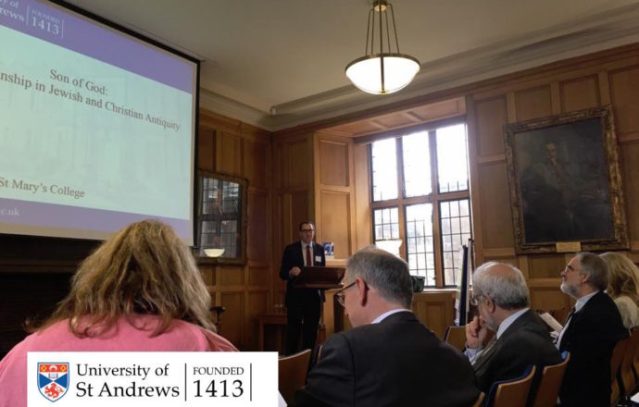Last month I presented a paper at the St. Andrews Biblical Studies Symposium. The conference was about Divine Sonship. Lectures and papers surveyed the concept of the Son of God in Jewish tradition, from OT to 2nd Temple literature and the possible influence from Near Eastern traditions. By the end of the conference it was quite clear that the Christology of early Christians and the idea of Jesus’ divine sonship cannot be easily pinned down in a Messianic form here or there. This is not new to anyone searching for an answer to this phenomenon. However, one single paper was different: Prof. Michael Peppard of Fordham University offered a different route: searching in the imperial cult for an answer to the complexity of Christian eschatology. Peppard’s dissertation was already focusing on the matter. This route is by no means new but it is certainly one of the promising routes that have not been consumed yet. It was obvious that Peppard’s proposal to look at the Imperial Cult provides relevant answers to important questions on Christology more than other Jewish texts. By the end of his lecture, the response of the addressees reflected the curiosity and, sometimes, uneasiness of looking “outside” Judaism. Peppard concluded his answers by saying that we are “not looking under every rock for Imperial ideology but acknowledging that on thousands of rocks the imperial cult is already found….” [see more here].
The next day, the concluding lecture was of NT Wright who provided his classic argument on the necessity to look for Jesus’ divinity, not in the Messianic prophecies but in the eschatological work of the God of Israel in the life of his people in prophetic writings such as Isaiah 40-63, which was the main source for the Jesus movement to reflect on to interpret the Jesus event. Of course his lecture did not lack criticism of the Religionsgeschichtliche Schule and the Modern Quest etc. But most importantly, Wright referred to Peppard’s talk in particular in a way that was not clear, at least to me, whether it challenges the “Third Quest” or not, but they were going to talk together more after the end of the lecture which concluded the conference.
As I said, it is not new to search for NT themes in the Roman imperial ideology which was pervasive all around the empire. But the question that arose from this particular conference was: is there a conflict between searching “within” Judaism and outside it i.e. in the wider Roman context? It appears to me that there are strong ideological motives lying inside the so-called Third Quest that back this implicit division. The impact of 20th century political conflicts, the insinuations made against Modern Quest scholars (that they revive Nazi scholarship in looking for Christian origins “outside” Judaism) and other matters led to the sensitivity of looking at Jesus of the Gospels in the image of powerful individuals like Augustus. While people still focus on where Jesus fits, the question of where Judaism itself fits is more relevant. I recently saw a blog post (unfortunately I lost it now) by a scholar talking about “the shifting” in Lukan scholarship towards believing that the author of Luke was a Jew.. I am not sure whether this is a reality by any means but it still remains in the mindset of many of us that Judaism is virtually the ancestors of rabbinic Judaism or some sort of Jerusalimite Jewish zealotry that could be contrasted with pan-Hellenism. This view defies reality once we look at Diaspora Judaism which makes it impossible to categorise its authors as one of these groups or the other (prominently Philo who practically appeared in the conference in my short paper as well as fragmentary allusions). It is time to seek a new integrative view of the Greco-Roman culture in which Judaism(s) is(are) a fundamental component in its fabric. Otherwise, the end of the so-called third quest becomes necessary and inevitable.
Back to Michael Peppard’s quote above: the question is, if the Imperial Cult plays a vital part in the background of those who preached the Gospel to large cities like Rome, how could we see that beyond the question of Christology? and how can we see the Jewishness of the Jesus movement as part of a wider strategy to defend Christianity as a religio licita? what other rocks do we need to look under?


You must be logged in to post a comment.